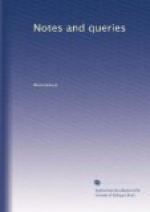An instance of the various changes and mutations to which, in the course of ages, a popular ballad is subject, exists in the “Frog’s Wedding.” The pages of the “NOTES AND QUERIES” testify to this in a remarkable degree. But no one has yet hit upon the original ballad; unless, indeed, the following be it, and I think it has every appearance of being the identical ballad licensed to Edward White in 1580-1. It is taken from a rare musical volume in my library, entitled Melismata; Musicall Phansies, fitting the Court, Citie, and Countrey Humours. Printed by William Stansby for Thomas Adams, 1611. 4to.
“THE MARRIAGE OF THE FROGGE AND THE MOUSE.
“It was the Frogge in the well,
Humble-dum, humble dum;
And the merrie Mouse in the mill,
Tweedle, tweedle twino.
“The Frogge would a-wooing ride,
Humble-dum, &c.
Sword and buckler by his side,
Tweedle, &c.
“When he was upon his high horse
set,
Humble-dum, &c.
His boots they shone as blacke as jet.
Tweedle, &c.
“When he came to the merry mill
pin,
Humble-dum, &c.
Lady Mouse, beene you within?
Tweedle, &c.
“Then came out the dusty Mouse,
Humble-dum, &c.
I am Lady of this house,
Tweedle, &c.
“Hast thou any minde of me?
Humble-dum, &c.
I have e’ne great minde of thee,
Tweedle, &c.
“Who shall this marriage make?
Humble-dum, &c.
Our Lord, which is the Rat,
Tweedle, &c.
“What shall we have to our supper?
Humble-dum, &c.
Three beanes in a pound of butter,
Tweedle, &c.
“When supper they were at,
Humble-dum, &c.
The frogge, the Mouse, and even the Rat,
Tweedle, &c.
“Then came in Gib our Cat,
Humble-dum, &c.
And catcht the Mouse even by the backe,
Tweedle, &c.
“Then did they separate,
Humble-dum, &c.
And the Frogge leapt on the floore so
flat,
Tweedle, &c.
“Then came in Dicke our Drake,
Humble-dum, &c.
And drew the Frogge even to the lake,
Tweedle, &c.
“The Rat ran up the wall,
Humble-dum, &c
A goodly company, the Divell goe with
all,
Tweedle, &c.”
From what I have shown, the reader will agree with me, that a collector of ballads from oral tradition should possess some acquaintance with the labours of his predecessors. This knowledge is surely the smallest part of the duties of an editor.
I remember reading, some years ago, in the writings of old Zarlino (an Italian author of the sixteenth century), an amusing chapter on the necessary qualifications for a “complete musician.” The recollection of this forcibly returns to me after perusing the following extract from the preface to a Collection of Ballads (2 vols. 8vo. Edinburgh, 1828), by our “simple” but well-meaning friend, “Mr. Peter Buchan of Peterhead.”




